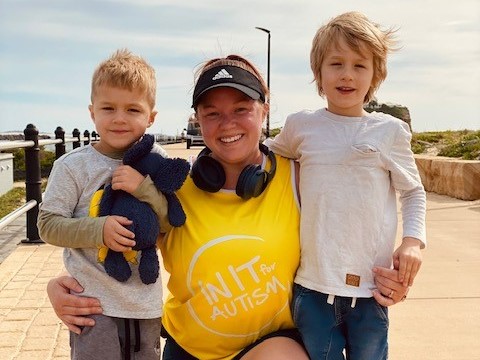Virginia Streit identifies as queer but when it comes to marching in Mardi Gras, she told us she's there primarily as an ally.
“My allyship is something I’ve been actively working on improving in the last few years,” Virginia, a Digital Marketing and Engagement Specialist with our CSIRO Publishing team, said.
“It's really important to me personally that people can express themselves to me. I want to be the kind of person who will stand up for people even if they're not in the room. I don't believe that anyone should be discriminated against at work or at home.”
Her commitment to being an ally comes in part from her personal history.
“My experiences coming out as a bisexual person when I was younger were pretty negative,” Virginia recalled. However, she’s come to recognise her privilege.
“I am white, cisgender and come from a relatively wealthy upbringing. Twenty years ago, when I came out, the way I was treated was rubbish. But I’m now understanding the way other people are being treated can be even more so,” Virginia said.
She added: “These days I see it a lot with our trans community.”
For Virginia, it’s become increasingly critical to be a reliable ally for people who could use the backup, aren’t always able to defend themselves – or might even just be exhausted from trying.
Learning to listen
Nerissa Jones is a Digital Learning Manager with our Education and Outreach team. For her, true allyship starts with actively looking past appearances and getting to know someone.
A proud Anaiwan woman from the New England Tablelands, Nerissa is used to having to defend her identity and that of her children.
“We get challenged all the time because I’ve got fair hair and my kids are real blondies,” Nerissa said.
“I have to explain, it’s not how we look, it’s what’s on the inside that determines how we identify.”
She adds that her perspective has also been shaped by her eldest son having autism spectrum disorder and her youngest being diagnosed with attention deficit hyperactivity disorder.
"I want my kids to grow up accepting people who are different to them. When you recognise your differences, you see what makes you absolutely amazing and fantastic.”

Getting past defensiveness
Virginia believes it’s an important part of her work with us to create safe spaces for her colleagues as well as the authors and creatives she works with.
“I really want to get better at using the right pronouns and the right language,” she said.
She also highlights other initiatives, including the Publishing team’s decision to support authors who want to change their name on a journal paper. The process now in place allows this to be done confidentially.
“We’re trying to make it easier for people of different backgrounds to publish with us and not be outed or face issues in their professional lives,” she said.
Virginia also actively seeks out diverse voices, whether it’s on Instagram or in work webinars.
“We’re really lucky that way. I’m so proud to be part of this organisation on so many levels. We do cool work. And as someone on the inside, I know we’re not ‘rainbow washing’, we’re actually walking the talk.”
She’s also committed to learning – even if it means sometimes discovering she’s got it wrong. As someone who trained in public speaking, Virginia was taught that taking a deep breath when she felt the urge to ‘um’ or ‘ah’ could help her become more articulate.
“I’ve found that’s actually a great lesson for allyship,” she said. “When I feel defensive, which I think all of us will feel at some point, I just take a deep breath and really try to listen to what the other person is saying.”
Earning the right to ask questions
Nerissa sees herself as being at the start of a journey – becoming a good ally is the work of a lifetime. And an essential tool in any aspiring ally's skillset is listening. Luckily, it’s one that can be actively cultivated. Just remember that asking questions is a privilege you earn.
"You can’t assume that because someone identifies, it’s their job to teach you about it. Some people will be willing and ready to talk and to share their experiences but some won’t. That’s why it’s important to first build a relationship,” Nerissa said.
“Then it’s about being approachable and creating a safe space. It’s great when we can jump on opportunities like marching in Mardi Gras. But getting together and starting to form those relationships is critical.”
Making sure it’s a safe space in person includes being attentive to cues like body language and facial expression. Virtually, it can mean making space for silences and continuing to reach out and make yourself available.
"We need to be ok with silence. Allowing someone to think about their answer is important, as is allowing people to withdraw from the conversation if they want to,” Nerissa added.
The most important step, however, might be getting to know yourself before you reach out.
“It’s easy to say we accept everyone, but do we recognise our own unconscious biases? Do we know our world view? We have to size up where we are before we can even start to understand where someone else sits in this world,” Nerissa said.
Both Nerissa and Virginia were part of our 70-strong group of marchers at this year's Mardi Gras parade as part of WordPride in Sydney.
